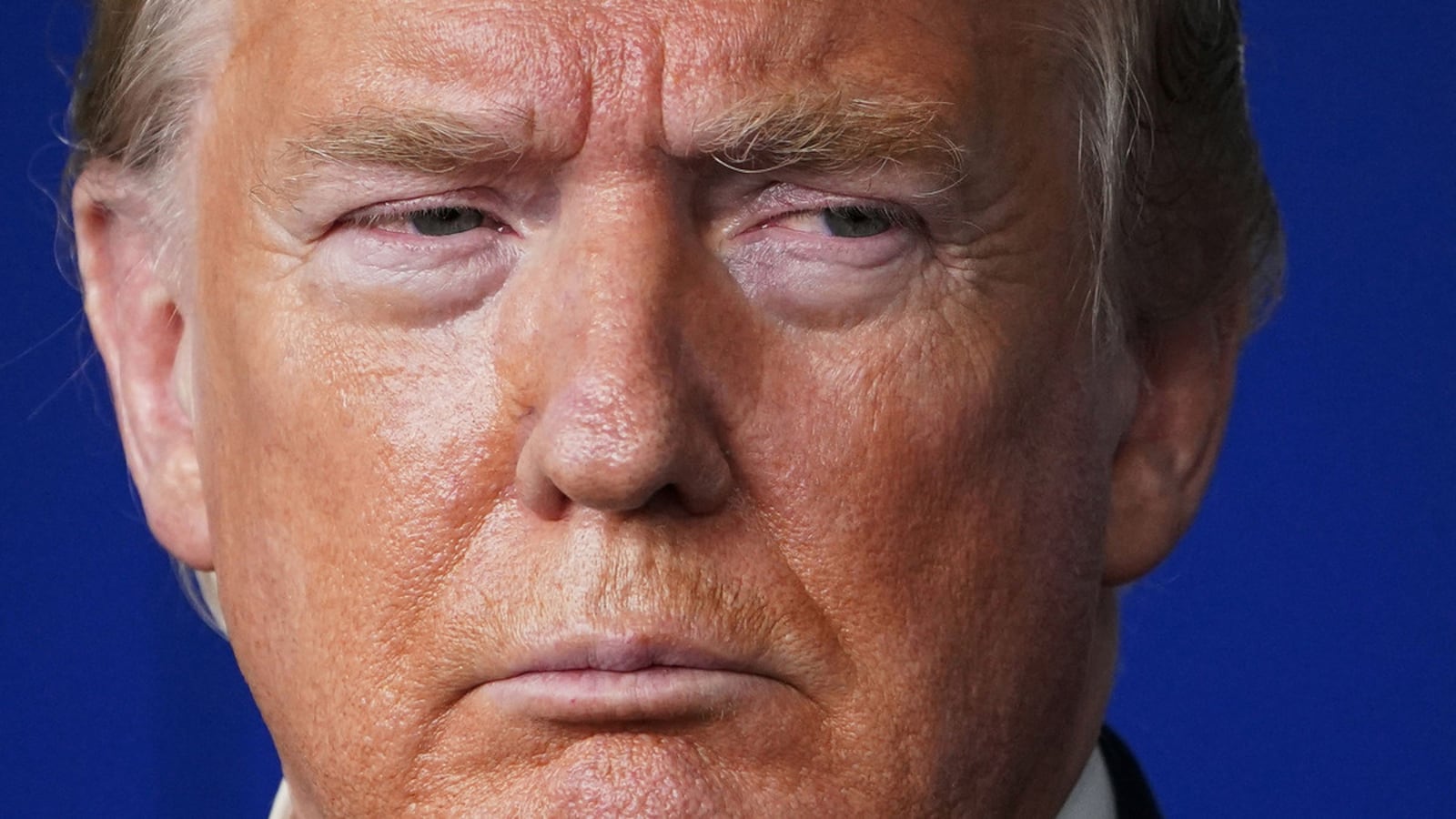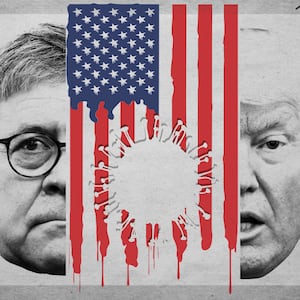In the beginning, Donald Trump said “I alone” can fix everything. Then, as the pandemic gripped the nation, Trump said, the Constitution required the states to take the lead and mandated that governors compete amongst themselves for critical medical equipment and decide whether or not to impose stay-at-home orders to protect their citizens’ lives.
But more recently, things took a different turn. Trump has declared that the country must be “liberated” in plenty of time for the fall election season. And if the states don’t agree, Trump is making it plain that he’s prepared to use the full force of the federal government, along with gun-toting militia members, to force governors’ hands, regardless of the danger to Americans’ lives.
If Donald Trump, Senate Majority Leader Mitch McConnell, and their corporate allies have their way, the pandemic will provide the pretext for an unprecedented campaign of federal interference with state governments, and possibly the wholesale voiding of hard-fought worker and other legal protections, some of which have been in place since the Great Depression.
The first indication of Trump’s scheme to coerce the states came several weeks ago when Attorney General William Barr complained that stay-at-home orders instituted at Trump’s express behest were “draconian” and said that the Department of Justice might intervene in court proceedings to undermine them. That was soon followed by a “statement of interest” by the DOJ in a lawsuit that successfully pressured a Mississippi city to limit the application of its social distancing rules to a church.
On April 27, Barr issued a memorandum to the nation’s United States Attorneys declaring the Justice Department is taking it upon itself to “monitor state and local” emergency public health policies and adjudge whether they’ve appropriately “balance[ed] public safety with the preservation of civil rights.”
As Barr explained it, the DOJ will now determine whether any “state or local ordinance crosses the line from an appropriate exercise of authority to stop the spread [of the virus] into an overbearing infringement of constitutional and statutory protections.” Barr named a U.S. Attorney from Michigan (whose governor has been a focus of Trump’s ire) as cohead of the project.
As The New York Times reported, Barr has also privately been spearheading a wide-ranging campaign, together with a network of Trump donors and religious and other conservative leaders, to force recalcitrant states to “open up.”
Tony Perkins, a right-wing religious leader close to Trump and a participant in the scheme, has declared: “The tolerance level has been reached, so either governors need to start partnering with churches and the private sector, or they’re going to lose control.” Put otherwise, if governors like Gretchen Whitmer, or as Trump has been wont to call her “that woman from Michigan,” don’t toe the line and “open up,” the DOJ may take to the courts in an effort to pry them open.
It remains, however, entirely unclear just how Barr proposes to challenge “overreach[ing]” public health measures under federal law. As the president himself has been emphasized at times he’s sought to avoid responsibility for the rapidly increasing COVID-19 death toll, the Constitution vests the states with broad “police powers” including and especially the authority to take measures reasonably calculated to protect the public health.
In the absence of discriminatory conduct or an infringement upon a constitutionally protected religious liberty right (as the DOJ has claimed in the context of religious services), the federal government has limited authority to interfere with such state regulations, and indeed has exceedingly rarely even attempted to do so.
Indeed, while Trump’s attorney general is making an unprecedented threat to establish the DOJ as the policeman of the states’ exercise of the police powers, Trump has declared that he has no authority to prevent the governors of states like Georgia to order the reopening of hair salons and tattoo parlors while COVID-19 caseloads continues to increase, in direct contravention of the president’s own guidelines.
Accordingly, it appears that the newly discovered power of the federal government to review state health protections does not extend to second-guessing the choices of governors to recklessly risk the lives of their citizens—but permits the second-guessing of governors prudently trying to protect their citizens.
In any event, rather than bringing meritless federal lawsuits, it is far more likely that Barr’s campaign will rely more on intimidation and pressure tactics than the law. The DOJ succeeded in getting its way in the recent Mississippi case simply by making a court filing in favor of the congregation. The mere threat that the DOJ will marshal the full weight of the federal government against recalcitrants like “that woman in Michigan” will inevitably have a political, if not a legal, impact.
Furthermore, GOP legislators and others have begun to file lawsuits in state courts alleging that their “liberty” has been impaired by efforts to protect the public health.
For example, one Illinois legislator actually won a courtroom victory against the application of the state’s stay-at-home order to him last week, though it may soon be overturned on appeal. A court challenge to the constitutionality of Michigan’s stay-at-home order failed, but the governor and Michigan’s gerrymandered GOP legislative majority are at odds on the issue.
Even as Barr has been ramping up his campaign against state efforts to protect the health of their citizens, Trump, together with congressional Republicans, are opening another front: this time against the state efforts to protect the rights of the most vulnerable workers.
On April 13, the U.S. Chamber of Commerce, a leading lobbying organization for large corporations, released a memo proposing a sweeping and unprecedented federal weakening or voiding of state and federal protections for employees and business customers during the pandemic, including limiting claims for exposure to the coronavirus itself to the weakening of anti-discrimination and layoff notice requirements.
The chamber even asked for the nullification of a Civil War-era law that rewards whistleblowers for exposing fraud in federal contracting, despite the already substantial evidence of fraud and other misconduct in connection with the massive sums being spent by governments in connection with the pandemic.
The president and his GOP allies heard the corporate call. Since then, McConnell has declared that the GOP will hold the requests of economically strapped states and municipalities for aid to defray some of the punishing costs they have incurred during the pandemic on Democrats’ agreement to enact many of labor law and liability stripping provisions the chamber has sought into law.
It remains to be seen whether McConnell’s gambit will succeed, but Trump is not waiting for the result. The nation’s meat processing plants, most staffed by large numbers of immigrant workers from Latin America, are second only to nursing homes and prisons in serving as deadly incubators for the coronavirus.
Several have been shut down after workers, who have reportedly worked in close quarters with limited or no safety protections, have been infected in sometimes staggeringly large numbers, and have in turn caused outbreaks in their surrounding communities. As one former worker put it, “If you’re not in a casket, they want you there.”
Last Wednesday, Trump issued an executive order declaring that meat processing is “critical infrastructure” under the Korean War-era Defense Production Act. That is the same act Trump has refused to invoke to facilitate the production of either PPE or viral testing. The executive order does not, as some initially, reported, squarely prevent states and localities from shutting down dangerous slaughterhouses; but the message it sent was clear: The president wants them open, regardless of the risk they may pose to workers’ lives.
The fact that Trump has intervened to protect the interests of meatpacking companies is striking not only because some of those firms have allowed their workers and their families to become ill, but also because slaughterhouses played a critical role in the development of modern labor regulation. Journalist Upton Sinclair’s 1906 novel The Jungle portrayed the extraordinary dangers faced by low paid immigrant laborers, most of them from Europe, in Chicago’s stockyards, and the book played a role in inducing the enactment of first federal meat inspection laws.
But the fight to provide legal rights for such unskilled workers took far longer, in part because a conservative Supreme Court majority consistently struck down state and federal worker safety protections until well into the administration of Franklin Roosevelt, often on the ground that they impaired workers’ economic “liberty.” It was only after the president threatened to “pack” the Court with new members that the court retreated, and began to uphold the New Deal reforms that included some of the very labor protections that McConnell is now seeking to void.
For decades, conservatives, including members of the Federalist Society which has been key in selecting the young judges Trump has named to pack the federal courts, have sought to resuscitate the so-called Lochner era (named after a 1905 Supreme Court case voiding New York law regulating sanitary conditions in bakeries to vindicate workers’ “freedom of contract”).
It would be a brutal irony if a moment in which many slaughterhouse workers are facing dangers of death they may not have faced since the time of Sinclair could be the time that a Republican president chooses to take away their legal protections, and likewise void states’ rights to protect their citizens from a deadly virus, in the name of “liberation.”






